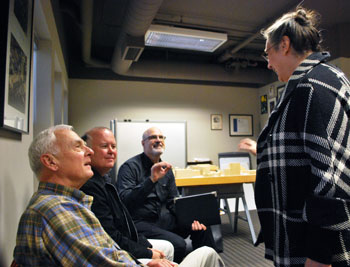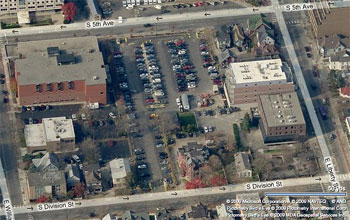Ann Arbor Downtown Development Authority board meeting (Nov. 6, 2013): Two voting items were considered by the board: (1) an award of a consulting contract to SmithGroupJJR and Nelson\Nygaard to develop a streetscape framework plan; and (2) approval of monthly permits in the public parking system for the 624 Church St. project.

From left: Local developer Peter Allen, 624 Church St. project owner Dennis Tice, that project’s architect Brad Moore, and Ward 1 city councilmember Sabra Briere. Briere accepted congratulations on her council re-election win the previous day. (Photos by the writer.)
Both items were approved on unanimous votes at the meeting, which featured perfect attendance by the 11 current members of the board. The following evening, on Nov. 7, the Ann Arbor city council confirmed the appointment of Cyndi Clark, owner of Lily Grace Cosmetics, to fill a vacancy on the 12-member DDA body. At its Nov. 6 meeting, the board did not discuss either Clark’s appointment or the other council agenda item affecting the DDA – a revision to the city ordinance that regulates the DDA TIF (tax increment financing) capture.
The sale of monthly parking permits for the 624 Church St. development was an issue that the DDA board had previously considered – for an earlier version of the project, which had actually completed the city approval process. It had gone through planning commission review and recommendation, with a site plan approved by the city council on March 4, 2013. For that earlier version, the project was required to provide 42 parking spaces for the additional residential square footage it contained beyond the by-right density under the city’s zoning code. Instead of providing the parking spaces on-site, the owner of the project sought to satisfy the requirement through the contribution in lieu (CIL) program – a request that was granted by the DDA.
For this revised and expanded version of the project – made possible through additional land acquisition – a greater number of parking spaces is required. And the project owner again sought to meet that requirement through the CIL program. So at its Nov. 6 meeting, the DDA board granted the project owner the ability to purchase 48 monthly parking permits in the Forest Avenue parking structure.
The DDA board also acted on its streetscape framework project. The contract awarded to SmithGroupJJR and Nelson\Nygaard is meant to provide guidance for developing future streetscape projects, not to design any specific streetscape project. The most recent streetscape improvement undertaken by the DDA was the Fifth and Division project, which included lane reconfigurations and bump-outs.
In addition to its voting items, the board received a raft of updates, which included reports on the first quarter financials. The DDA is essentially on course to realize $4.5 million in TIF capture revenue and about $19 million in parking revenue. Other updates included reports on preparations for the NHL Winter Classic hockey game, debriefing on the International Downtown Association conference attended by some board members and staff, Freedom of Information Act issues, and public commentary.
The board heard from Ray Detter, speaking on behalf of the downtown area citizens advisory council, about the ongoing downtown zoning review. Detter’s remarks were countered by DDA board members. Detter reprised his comments at the city planning commission meeting later that evening. So that back-and-forth will be reported out in more detail as a part of The Chronicle’s Nov. 6, 2013 city planning commission report. [Full Story]







